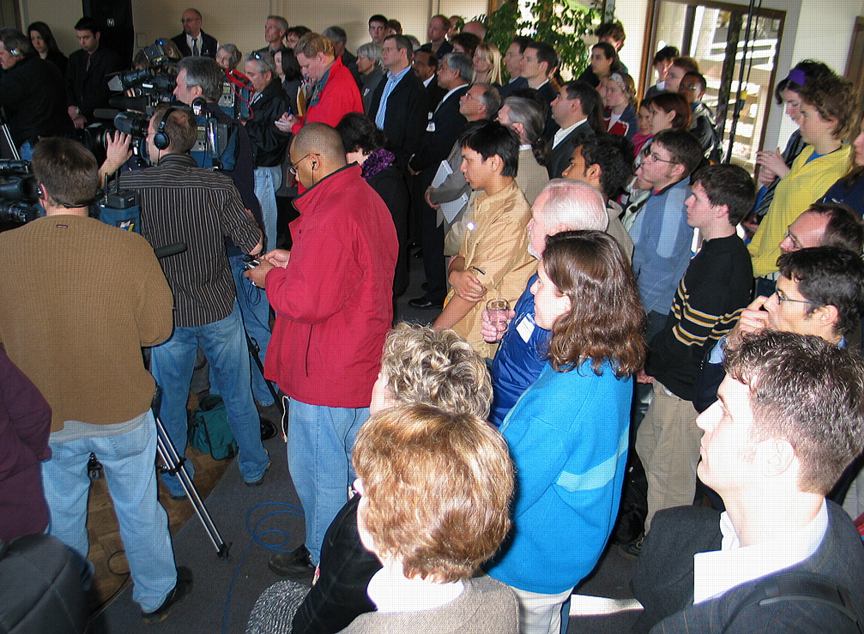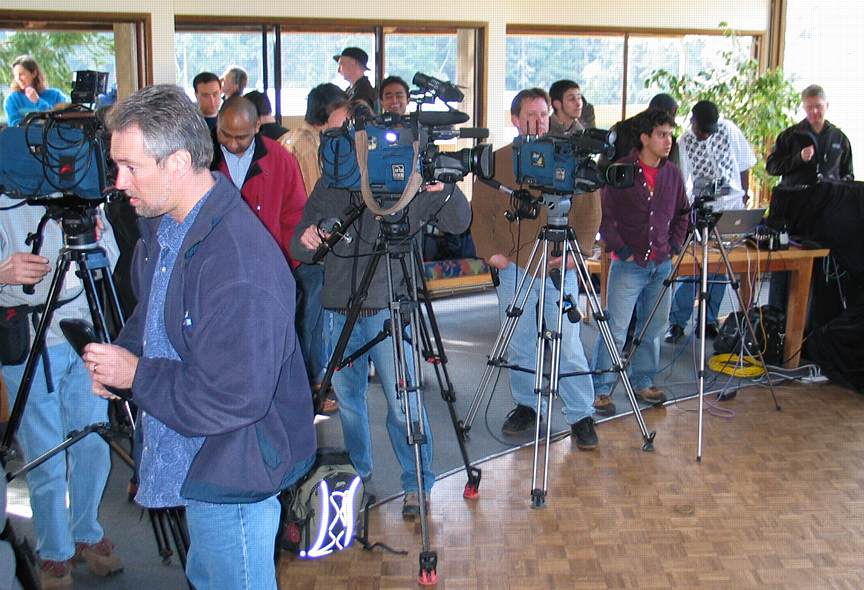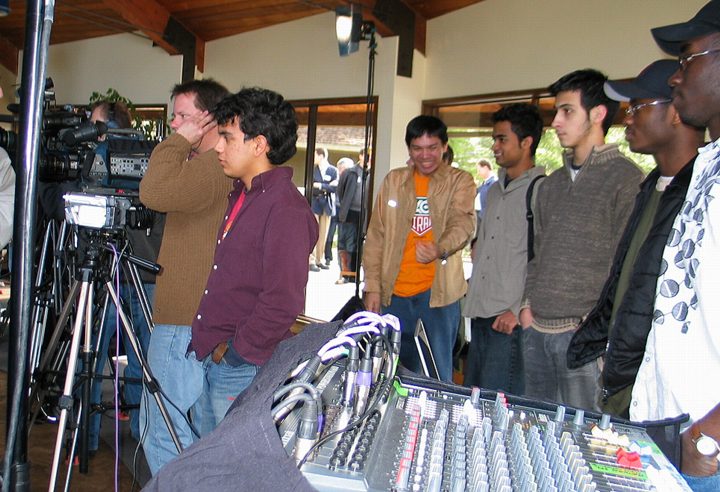Full video coverage of the event
- TV and Print Media coverage of the even
- The crowd on hand made up of members of the Board of Clean Current and EnCana and Faculty and students of Lester Pearson College.
- Coverage of this story in the Pearson College LINK
- Various Victoria and Vancouver based media arrived to record the announcement for their broadcasts later on.
- Students of the racerocks.com activity webcasted the presentation live on the internet.
| PRESS RELEASE below……February 25, 2005 (Link to PDF version)- ENCANA PARTNERS TO ENABLE PEARSON COLLEGE – ENCANA – CLEAN CURRENT TIDAL POWER DEMONSTRATION PROJECT AT RACE ROCKS, BC Victoria – Thanks to an innovative partnership between Lester B. Pearson College of the Pacific,EnCana Corporation and Clean Current Power Systems Incorporated, Canada’s first free-stream tidal power project will be built at the Race Rocks Ecological Reserve, offshore of Vancouver Island in British Columbia. The project will enable the world famous marine park to tap into surrounding ocean currents and convert tidal energy to electric power for its needs beginning in early 2006. Making the announcement were: Gwyn Morgan, President and CEO of EnCana, Glen Darou, President and CEO of Clean Current, Richard Neufeld, British Columbia Minister of Energy and Mines, and Stuart Walker, Director of Pearson College. 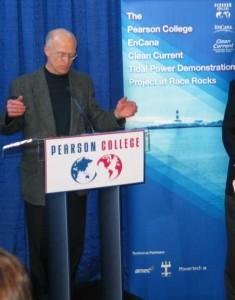 Officially known as the “Pearson College – EnCana – Clean Current Tidal Power Demonstration Project at Race Rocks,” the project is enabled by a $3-million investment from the EnCana Environmental Innovation Fund.“EnCana is pleased to be a partner in this first-class, alternative energy project,” said Morgan. “Our investment in this B.C.-based unconventional environmental and power technology reflects our desire to tangibly encourage innovative energy solutions.” EnCana’s Environmental Innovation Fund was established to advance new technologies and solutions that improve environmental performance associated with consuming and producing energy. Commercial proceeds from financed projects will be re-invested into the fund to ensure their sustainability. Officially known as the “Pearson College – EnCana – Clean Current Tidal Power Demonstration Project at Race Rocks,” the project is enabled by a $3-million investment from the EnCana Environmental Innovation Fund.“EnCana is pleased to be a partner in this first-class, alternative energy project,” said Morgan. “Our investment in this B.C.-based unconventional environmental and power technology reflects our desire to tangibly encourage innovative energy solutions.” EnCana’s Environmental Innovation Fund was established to advance new technologies and solutions that improve environmental performance associated with consuming and producing energy. Commercial proceeds from financed projects will be re-invested into the fund to ensure their sustainability.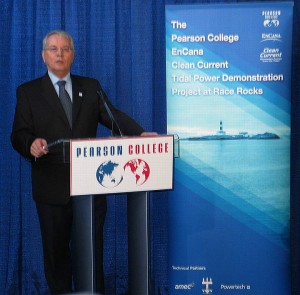 “The commitment by Premier Campbell in promoting alternative energy sources has helped British Columbia become a world leader in sustainable environmental management,” said Neufeld. “The province commends projects like this one, as they show our commitment to developing clean energy solutions that will benefit all British Columbians.” The multi-year demonstration project will involve the installation, operation and monitoring of a 65kW free-stream tidal turbine generator in the water near Race Rocks, a provincial ecological reserve located 10 nautical miles southwest of Victoria. “The commitment by Premier Campbell in promoting alternative energy sources has helped British Columbia become a world leader in sustainable environmental management,” said Neufeld. “The province commends projects like this one, as they show our commitment to developing clean energy solutions that will benefit all British Columbians.” The multi-year demonstration project will involve the installation, operation and monitoring of a 65kW free-stream tidal turbine generator in the water near Race Rocks, a provincial ecological reserve located 10 nautical miles southwest of Victoria.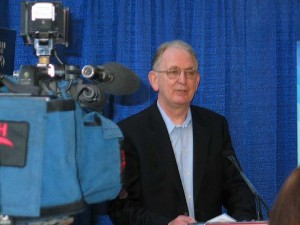 Clean Current is a private British Columbia-based company that designs and licenses technology that efficiently converts the energy of tidal currents into electricity. Clean Current’s proprietary technology consists of a horizontal-axis ducted turbine with a direct-drive variable speed permanent magnet generator. The turbine generator is equally efficient in both directions as the tidal currents reverse twice each day.“This Canadian technology is simple, efficient and environmentally friendly,” said Darou. “We believe it is highly exportable technology, with strong potential to succeed in international settings. Our company is delighted to have the support of EnCana, Pearson College, and technical partners AMEC, Powertech Labs Inc. and Triton Consultants Ltd.”Pears Clean Current is a private British Columbia-based company that designs and licenses technology that efficiently converts the energy of tidal currents into electricity. Clean Current’s proprietary technology consists of a horizontal-axis ducted turbine with a direct-drive variable speed permanent magnet generator. The turbine generator is equally efficient in both directions as the tidal currents reverse twice each day.“This Canadian technology is simple, efficient and environmentally friendly,” said Darou. “We believe it is highly exportable technology, with strong potential to succeed in international settings. Our company is delighted to have the support of EnCana, Pearson College, and technical partners AMEC, Powertech Labs Inc. and Triton Consultants Ltd.”Pears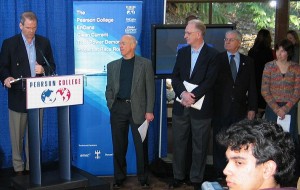 on College, one of ten United World Colleges worldwide, is the custodian of the Race Rocks Ecological Reserve, located three nautical miles from campus. Diesel-powered generators currently provide electricity requirements at the reserve. Students and staff will work elements of the tidal power demonstration project into their studies.“This is a terrific project for Pearson College, in that it supports our goal of making the ecological reserve a showcase for alternative, low-impact technologies such as tidal power,” said Walker. “We would like to thank Clean Current for their commitment to developing the technology and EnCana for the financial support that is making this demonstration project possible.” on College, one of ten United World Colleges worldwide, is the custodian of the Race Rocks Ecological Reserve, located three nautical miles from campus. Diesel-powered generators currently provide electricity requirements at the reserve. Students and staff will work elements of the tidal power demonstration project into their studies.“This is a terrific project for Pearson College, in that it supports our goal of making the ecological reserve a showcase for alternative, low-impact technologies such as tidal power,” said Walker. “We would like to thank Clean Current for their commitment to developing the technology and EnCana for the financial support that is making this demonstration project possible.”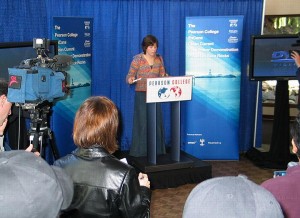 Second Year Pearson College student Alyssa Holland (year 30) concluded the presentation , by thanking the speakers. As a student involved in Environmental Systems and the diving program, she shared the enthusiasm she has for the resources of the area and emphasized the great importance she and other students attach to the effort of those involved in this project in the ongoing goal of producing energy sustainably.Below is the complete version of her speach: Second Year Pearson College student Alyssa Holland (year 30) concluded the presentation , by thanking the speakers. As a student involved in Environmental Systems and the diving program, she shared the enthusiasm she has for the resources of the area and emphasized the great importance she and other students attach to the effort of those involved in this project in the ongoing goal of producing energy sustainably.Below is the complete version of her speach:
BACKGROUNDER: (Link to PDF version)Race Rocks is a unique ecosystem located at the eastern entrance to the Strait of Juan de Fuca, three nautical miles from Pearson College and ten nautical miles southwest of Victoria, BC. The rocky outcroppings that form the Race Rocks group of islands are the visible summit of an underwater mountain and are washed daily by tidal currents that can run at up to seven knots. These swift waters are the lifeblood of breathtakingly diverse plant and animal life – recognized internationally as a treasured ecosystem. To First Nations people, Race Rocks was a banquet table in the swift flowing waters known to them as XwaYen. To early mariners it was a formidable hazard to be avoided. To fishers it was a haven for finding rockfish and halibut. To scuba divers it is an underwater paradise with thriving colonies of marine organisms. To generations of future researchers, college students and school children, it will be an awe-inspiring outdoor and virtual classroom. Additional information on Race Rocks is available at: www.racerocks.ca Lester B. Pearson College of the Pacific EnCana EnCana Environmental Innovation Fund The EnCana Environmental Innovation Fund (the Fund) supports these goals by lending financial support toward the development and commercialization of innovative new technologies and practices that create solutions to the environmental issues facing the energy sector. The fund is designed to invest in both external and internal projects that:
Targeted areas include air emission reductions, water conservation, renewable energy, and energy-efficiency improvements. To date, four projects have been financed, including a hybrid electric vehicle demonstration, a water recycling project, a drill cutting recycling facility and a renewable energy project. The Fund became operational in January 2004 and is currently reviewing candidate projects. Clean Current Power Systems Incorporated Efficiency and operability in salt water are the key ingredients of a successful tidal technology. Clean Current’s tidal turbine generator is a bi-directional ducted horizontal axis turbine with a direct drive variable speed permanent magnet generator. This proprietary design delivers better than 50 per cent water-to-wire efficiency, a significant improvement over competing free stream tidal energy technologies. Operability is enhanced by a simple design that has one moving part – the rotor assembly that contains the permanent magnets. There is no drive shaft and no gearbox. The turbine generator has a design life of 10 years (major overhaul every 10 years) and a service life of 25-30 years. During that time it will generate electricity with zero emissions, a minimal footprint on the bottom of the ocean and negligible impact on marine life. To ensure success Clean Current has enlisted the assistance of technical partners AMEC Americas Limited and AMEC Dynamic Structures Limited (both subsidiaries of AMEC PLC),Powertech, (a subsidiary of BC Hydro) and Triton Consultants Ltd. |
||||||||||||



